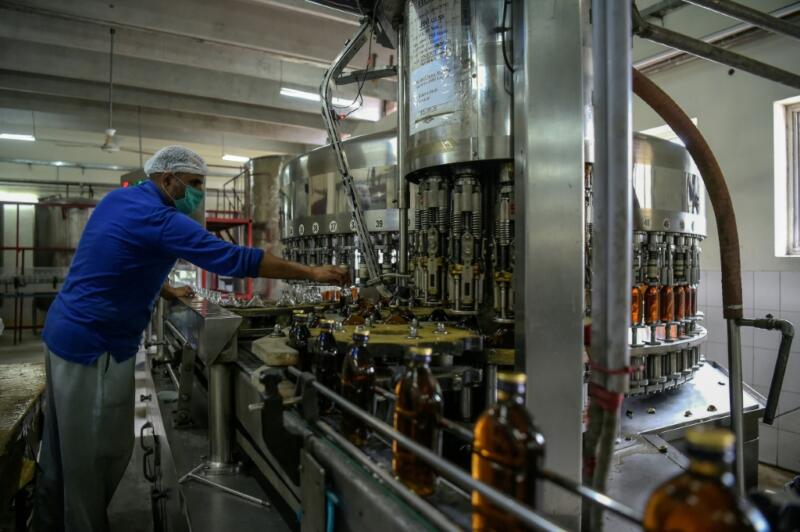Booze battle for Pakistan’s drinkers during lockdown and Ramadan
The largest legal supplier of alcohol is the Murree Brewery, in the garrison city of Rawalpindi, a legacy of the British Raj that produces a range of beers and spirits catering to Pakistan’s “non-Muslims” and foreign residents. (AAMIR QURESHI)
Islamabad (AFP) – Drinking alcohol in Pakistan can be a complicated affair at the best of times, but for 25-year-old student Iram, the coronavirus pandemic has made getting a beer all but impossible.
Every spring, as the weather starts to heat up, she usually enjoys a cool brew or two.
However, this year the lockdown has compounded the annual booze shortage that comes during the holy month of Ramadan, making the task of finding a drink an even greater challenge.
“There is no more beer!” lamented Iram, an Islamabad resident who asked AFP to use a pseudonym for fear of reprisals in this conservative country where drinking is illegal for Muslims, even though many people enjoy a tipple.
“I checked with four bootleggers. Three had run out and the last one was offering 24 cans for 15,000 rupees ($95).”
The sum is equivalent to the monthly wage for many people, and Iram initially baulked at the price. When she changed her mind a couple of days later, the beer was gone.
Similar scenes are playing out across Pakistan. In Lahore, the second-largest city after Karachi, things are “dry, dry, dry,” said Daud.
“The hotels are closed, so there’s no place to get local booze,” said the lawyer, who also asked AFP not to use his real name.
In Pakistan, home to about 215 million people — 97 percent of whom are Muslim — only a minority is thought to drink, but this includes the elites who can afford to buy imported alcohol.
“For Muslims in Pakistan, drinking alcohol is prohibited and talking about it is taboo,” Pakistani novelist Mohammed Hanif once wrote in a column in the New York Times.
“Drinking and denying it is the oldest cocktail in the country.”
– Ramadan closures –
The stigma is particularly intense during Ramadan, when Pakistan’s few liquor stores are closed.
The largest legal supplier of alcohol is the Murree Brewery, in the garrison city of Rawalpindi, a legacy of the British Raj that produces a range of beers and spirits catering to Pakistan’s “non-Muslims” and foreign residents.
“Normally, we still manage to get what we are looking for. But this year, it has become very complicated,” said Hassan, a thirty-something banker living in Islamabad.
Ramadan this year came just as Pakistan was locked down in a bid to slow the spread of COVID-19, which has killed at least 585 people across the country with numbers rising daily.
Because of the pandemic, air travel into Pakistan has stopped, and with it the flow of passengers bringing in duty-free booze.
For the last month and a half, the Murree Brewery, like many other manufacturers, was forced to halt production. Instead of producing drinks, Murree is now using alcohol to make hand sanitiser.
Isphanyar Bhandara, Murree’s chief executive, said Pakistan’s alcohol shortage means drinkers are being forced to source home-made alternatives that are frequently unsafe.
“The only people who are thriving are the ones who already have imported alcohol in their stores and are selling them at jacked-up prices,” Bhandara said.
“The other beneficiaries are the murderous people who are making home-made alcohol with low quality which is making poor people die.”
In April, at least 29 people died after drinking bootleg liquor, according to an AFP tally.
Pakistan will begin easing its nationwide lockdown over the weekend, but the move is not expected to have much impact on alcohol supplies, with liquor sales remaining off-limits for Ramadan.
– Booze history –
Imported whisky of only average quality nowadays fetches about $100 a bottle, compared to about $60 this time last year, according to several smugglers and buyers.
Booze has a deep history in the country, from the country’s revered founder Muhammad Ali Jinnah who was said to enjoy spirits to military dictator Pervez Musharraf’s love of whisky.
Alcohol was legal for all Pakistanis to purchase until 1977, when then prime minister Zulfikar Ali Bhutto banned its sale in an attempt to fend off right-wing Islamist parties.
A senior police official said underground sales persist, with bottles smuggled into Pakistan through sparsely populated areas on the south coast.
“Busting Pakistan’s liquor market is quite a task as the elite of the country makes the essential consumers,” the official said.
Faced with so many obstacles and a month of sobriety, Daud, the lawyer in Lahore, said in the absence of booze he is smoking more hashish, which is produced in large quantities in northwest Pakistan.
“My dealer still delivers to my house,” Daud said. “It’s just a lot easier.”
Disclaimer: Validity of the above story is for 7 Days from original date of publishing. Source: AFP.


